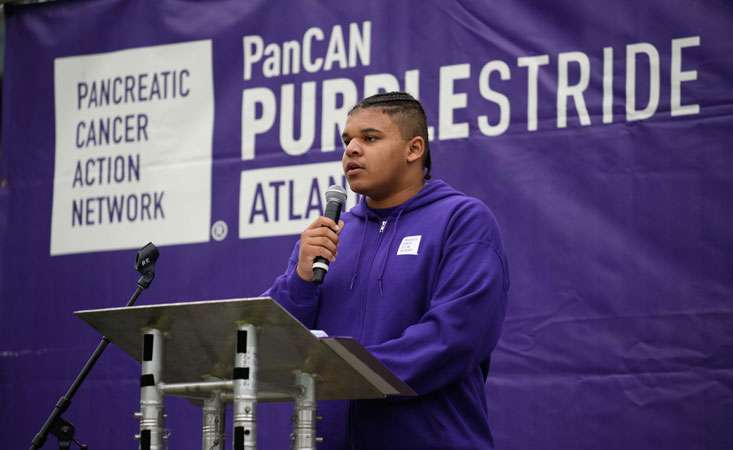
Tybre Faw addresses the crowd at PanCAN PurpleStride Atlanta.
On March 4, 2018, 10-year-old Tybre Faw stood in a crowd gathered near the Edmund Pettis Bridge, holding up a handwritten sign. His dream: To meet U.S. Representative John Lewis, an icon of the civil rights movement, who was there to commemorate Bloody Sunday, the day in 1965 when activists, including Rep. Lewis, staged a protest that is now considered an important turning point that led to the Voting Rights Act becoming law.
Tybre had learned about Rep. Lewis and other early civil rights leaders in school and was inspired by the stories he heard. So Tybre waited with his grandmothers, who had driven him seven hours from Johnson City, Tenn., for the march. When Rep. Lewis arrived, he saw the sign. And Tybre. Together, they walked across the bridge to honor Bloody Sunday.
That encounter sparked an enduring friendship, one that brought Tybre to Washington D.C. many times and to marches and events with Rep. Lewis to continue the fight for social justice.
Then, in 2020, as Tybre puts it, “Pancreatic cancer took my hero.”
Now, the 16-year-old is committed to raising awareness of pancreatic cancer while also carrying on his hero’s legacy of activism
“Since pancreatic took my hero way too soon, I felt that the least I can do is educate people and help prevent pancreatic cancer,” he said. “I can help other people make sure that their loved ones don’t get taken and so they never have to experience what I experienced.”
Tybre said he vividly remembers the moment he met Rep. Lewis six years ago.
“He has this presence and I was crying,” Tybre said. “I was honored. I was so, so happy I was able to meet my hero. Not a lot of people get to meet their hero. I had a lot of things going through my head. But mostly it was life changing.”
That day in Selma launched Tybre into the public spotlight – his poise and resolve captured the nation’s attention. And his commitment to the cause continues to inspire. He’s now the youth advisor for the John Lewis Institute, an organization focused on a range of causes including youth empowerment, voting rights education and pancreatic cancer awareness. He’s also a national student ambassador for the 400 Years of African American History Commission and the author of two children’s books focused on his relationship with Rep. Lewis.
Through it all, Tybre honors his mentor’s spirit.
“Being humble, being respectful, being disciplined and being caring and loving – just doing simple things keep John’s memory alive within me,” he said. “Also, when we go out to travel, when we go to DC or Alabama, we go by Atlanta and we go by his grave. I always pray and ask him for his voice, his guidance, and to keep his hand on my shoulder.”
At this year’s PanCAN PurpleStride event in Atlanta, Tybre was a featured speaker. He channeled his mentor’s guiding force to address a crowd of pancreatic cancer survivors and loved ones, connecting the activism he learned from Rep. Lewis with the sea of purple in front of him.
“The Congressman was a light and an influence to so many – and I’m here to help carry his torch forward,” Tybre said to the crowd. “I think in a sense, that’s why we are ALL here – trying to bring light to the notion that we are better when we work together. All of us have the power to unite, to inspire, and to make a difference. Even for me, at 16 years old, I know our sense of community can’t just be a concept. It’s a call to action.”
For Tybre, who is now a rising junior and committed student athlete as a defensive end on his high school football team, he takes one of his late mentor’s most famous sayings with him forward, to get in “good trouble, necessary trouble,” when it furthers the cause of justice.
That can mean becoming an advocate; it can mean raising money for a PurpleStride event; it can mean talking to a neighbor.
“Let’s get people involved and spread awareness throughout the community to help bring change,” he said. “It takes small steps. Talk to a random stranger and educate them. Or your friends and family so they can spread the word. Then things build and build on top of each other to where you can start doing the bigger things.”














